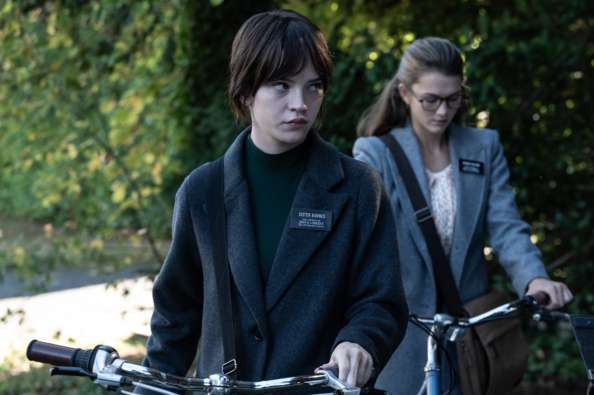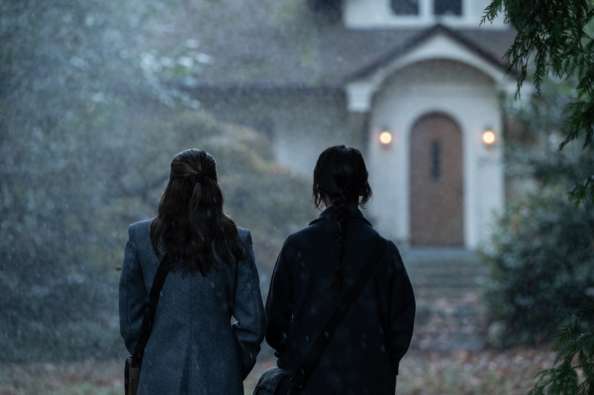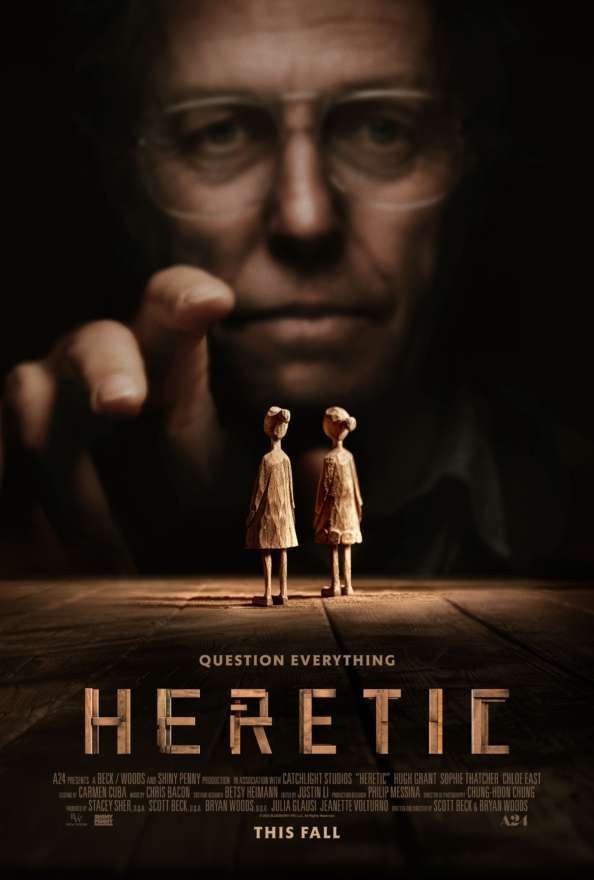ARTICLE AD
One of the most intriguing films in theaters now is Heretic. This horror-suspense thriller, written and directed by Scott Beck and Bryan Woods, showcases their storytelling prowess once again. The duo, who hail from Bettendorf, Iowa, first gained fame with A Quiet Place in 2018. Their latest film, Heretic, had already recouped its production costs by its opening weekend. By November 14, 2024, it had grossed $22 million worldwide on a budget of less than $10 million.
A Battle of Wits and Faith
In Heretic, two Mormon missionaries, Sister Paxton (Chloe East) and Sister Barnes (Sophie Thatcher), are invited into the home of Mr. Reed (Hugh Grant). Reed claims his wife is baking a pie in the kitchen, fulfilling the missionaries’ rule of not entering a home without a woman present. But things quickly take a sinister turn. The film evolves into a tense battle of wits and faith between the young women and Reed, a man who may be hiding diabolical secrets.
An In-Depth Exploration of Religion
With “Heretic” Beck & Woods have created an original script for a film that is a very in-depth talk about religion and life-after-death. It’s all couched within a horror movie concept. Talk—and deep concepts—dominate the movie.As Scott Beck told Matt Grobar of “Deadline”: “Heretic was something that Bryan and I had just been scratching at—the idea of religious ideologist Trojan horsing into a genre movie—for years and years.”
Personal Inspiration
Bryan Woods: “We started writing the film 10 years ago, and got to the young missionaries meeting Mr. Reed. They sit down with him. Mr. Reed opens his mouth, and immediately we kind of stopped dead in our tracks, because he has a genius-level IQ. He has studied all the world’s religions, and we felt like we had not done that work yet. We’ve been interested in religion and cults our whole lives, but we hadn’t sat down and read the Quran or the Book of Mormon. We hadn’t filled our heads with enough information. So we spent the last decade just enriching our point of view—speaking with a lot of people, sitting down with missionaries, reading a lot of atheist thinkers and ingesting their points of view. The reason we picked up the script again and kept writing wasn’t so much that we reached a point of, ‘We did it! We’ve solved religion!”’ or, ‘We’ve read enough to understand Mr. Reed.’ It was actually a confluence of personal and professional events.”
Woods said, “Every time we’d write a line, we’d have to stop and then go to Wikipedia to research something. It just felt inorganic, and so we did some fun research over the course of 10 years so that it could be a first language once we got further into writing Reed.” Woods told the “Hollywood Reporter” (David Brians, Nov. 9, 2024), “We also set out to make a movie that was deeply personal in terms of our relationship with the subject matter of belief and disbelief and what happens when you die. So, after pouring out all our neuroses and spilling our guts into this movie, it’s very exciting to see it connect with audiences, to say the least. We read interesting thinkers like Christopher Hitchens and Richard Dawkins. It wasn’t rigorous research every night at the library, but we read a lot of atheist thinkers and contemporary philosophers, as well as holy books we’d never read like the Book of Mormon or the Quran, just so that it could be a first language once we got further into writing Reed.”
GENESIS

Sophie Thatcher (L) and Chloe East in “Heretic.”

The Last Picture House in Davenport, Iowa, owned by Scott Beck and Bryan Woods.
The red-headed Woods went on to say, “It was just in our lives we had hit this emotional low point where it seemed like everything was going wrong. At that low point, my father passed away unexpectedly from esophageal cancer…It was that kind of pain and depression. Confrontation with these large questions of, ‘What happens when you die? Is there something? Is there nothing?” It was that moment where we were like, ‘It’s time to finally pick up the script and write it.’ Because we were feeling it so raw emotionally. We always felt that “Heretic” needed to be one of those projects that’s just embarrassingly personal, and we’ve always dreamed of doing a movie like that.” Woods explained, “It was time to express all of our fears and anxiety about what happens when you die and the mystery of death. So that’s where it came from, and once we sat down to write the script in earnest, it just poured out of us.”
Partner Scott Beck added, “We wanted to swing in the opposite direction of “A Quiet Place” and “65”, two films that are void of dialogue and are straightforward thrillers. For “Heretic” it was all about how we could weaponize dialogue and ideas about theology to create something that hopefully feels as scary a “A Quiet Place.” Beck pointed out, “There’s a line in the movie that goes ‘The more you know, the less you know’ and the older we get (they are 40), we find ourselves gravitating to the philosophy that life is a mystery. And what happens when we die is the greatest mystery, but there’s something beautiful in not knowing. There’s something beautiful in the pursuit of the truth of knowing, while also embracing the fact that you won’t know until it’s too late.” As the young men pointed out in various interviews, almost every horror movie has fear of death on its mind.”
The pair told the University of Iowa alumni magazine, “Every scary movie is about the same thing. It’s about our human fear of death and this question of what happens when you die. We wanted to turn that conversation that we’ve been having since we were eleven years old (when the pair began making small films in the Iowa Quad Cities) into a movie.”
FILM FINANCING

Interior of the Last Picture Show in Davenport, Iowa.
Scott Beck: “I think it’s our responsibility as filmmakers not only to think creatively about the story, but to think creatively about how do we get movies made in this landscape right now, especially coming from the viewpoint that we love movies that aren’t based on anything else and ostensibly are original stories. I think about “Heretic” the same way I think about “A Quiet Place.” When working on the script for these movies we didn’t think either were necessarily a home run, meaning we needed to protect ourselves to just have the means to make each movie. So each movie was written in the spirit of, can we make this for $50,000 in our home state of Iowa? And best case scenario, can we get it made at the studio level with proper resources? “Heretic” was certainly something, because of the content of having a theological debate in the vessel of a thriller, that we felt it may not be a home run, But, if so, a home like A24 could incubate that in a responsible way, both creatively and financially. I think it’s in our interest, also, when creating these movies, to make sure that it feels like there’s a demand to see the movie in a theater. So, while certain people have compared “Heretic” to a stage play, we’re very adamant about the fact that it’ a piece of cinema. (It should be noted that the pair now owns “The Last Picture Show” theater in Davenport, Iowa, where “Heretic” premiered on November 8th with one of the film’s stars, Chloe East, in attendance.) As of November 15, “Heretic” had earned close to $22 million worldwide.
Bryan Woods: “There is a conversation, though, right now, that we’re picking up on in movie culture right now, this feeling of, “Oh, if only movies were cheaper then they would be more financially responsible and, therefore, more successful. It’s an interesting question to be asking, but, also, we would caution against that a little bit because you do want to preserve this feeling of spectacle, this feeling of going to a theater and seeing something special. Big movies and studios that spend a lot of money on movies, that’s a great thing. I think what’s not a great thing is just how boring it’s all gotten. It’s gotten too easy to make white noise, and so taking risks on a big level, for us, it is a great thing.” Woods added, “With movies, they haven’t quite replicated that experiential feeling of going to a cinema, watching a piece of work with 200 strangers.”

Hugh Grant: A Weaponized Casting Choice
Scott Beck: “We feel like one of the movie’s secret weapons is Hugh Grant. Hugh Grant is an actor who has charmed worldwide audiences with his romantic comedies, and yet this movie, we kind of weaponize that good will that he’s formed with an audience. Partly because of that, the movie keeps you guessing. ‘Am I in a dangerous situation or am I just perceiving danger that’s not really there?” Beck & Woods shared this marketing tactic with the University of Iowa alumni magazine in an interview. Grant, himself, during an appearance on ‘Late Night with Seth Meyer’s, said of this uncharacteristic role, “I spent months building up a huge biography for the character. I don’t know if it helps at all, but it seems to calm me down. It’s better than Lorazepam. He (Mr. Reed) is not exactly charming. What’s so fabulous about this is that it’s so different. What I was aiming for was a kind of groovy professor—a bit of a twat is the word. He’s a prankster who just, for some reason, is not very popular so he over-compensates by being a bit too fun.” Grant went on to say, of his career, “There I was doing nonsense jobs for 10 years…the Rom-com era, Mr. Stuttery-blinky. And then, suddenly, out of the blue, comes “Four Weddings & A Funeral.” I made the terrible decision of acting like that in interviews and, quite naturally, on the back of that, people started to loathe me—at least in England they started to loathe me.” (laughs).
High Praise
Commenting on his co-stars, Chloe East as Sister Paxton and Sophie Thatcher as Sister Barnes, Grant praised their performances, saying, “They are properly good and very three-dimensional and likeable. It could have happened that they came off as zealous Mormon boors.” As Beck & Woods have acknowledged, “Much of this movie is about dialogue and philosophical thoughts and ideas, a man who’s talking, almost mansplaining, but also two women who are trying to basically have a conversation between each other just on their faces. Learning about how much people say when they don’t say anything has always been a good tool to have in our writing toolbox.” The two told me back in 2018 that it was a class in American sign language on campus at the University of Iowa that sparked “A Quiet Place” and, once again, the 2007 graduates of the University of Iowa in communication studies credit a class they took at Iowa on nonverbal communication with helping to inspire their storytelling style. Both of the female leads grew up Mormon; that also helped the story.
Both Steven Spielberg and Steven King have weighed in as admiring “Heretic.” Spielberg called up producer Stacey Sher, because Spielberg had cast Chloe in “The Fabelmans” and wanted to see where she had gone in her career. Beck & Woods asked Sher, producer of “Pulp Fiction,” to help them get permission to use all of the cultural touchstones they wanted in the movie, such as the rights disputes between Radiohead, Lana Del Rey and the Hollies. There were also references to games like Monopoly. Said Bryan Woods, “There was no back-up plan! We were terrified. When we wrote that scene, we were elated and so proud of it, but then that feeling was instantly followed by: ‘This will never get off the page. We will never get Monopoly cleared. We will never be able to air Radiohead’s dirty laundry.’ So it became a depressing moment , and that’s when you pick up the phone and you ask Stacey Sher to please help produce this movie with us. We asked her to help us do what felt like the impossible, which was get all of these pop cultural touchstones into the movie, so there was absolutely no back-up, and we were sweating it even up until three weeks ago. There was some last-minute wrangling about rights,” Bryan Woods told Brian Davids of “The Hollywood Reporter.”
OTHER CAST

Chang-hoon Chung, the man who shot “The Handmaiden” and “Oldboy” did great work cinematically with the interior of the house that passes as Grant’s. Topher Grant (“That 70s Show,” “BlacKkKlansman“) portrays Elder Kennedy. Also a huge help to the film’s success was Phil Messina, production designer and art director. Messina had worked on “The Hunger Games: Catching Fire” (2013) and “The Hunger Games: Mockingjay” (2015) and “Mother” (2017). As Woods told Matt Grobar of “Deadline,” “We’re very visual writers, and I mean that literally. Like, our script for “A Quiet Place” had certain pages that were completely blank, and then just had one word on it to emphasize a certain sound effect, or would have images and diagrams to help sell the concept of a modern-day silent film. With “Heretic” we’re using the Monopoly board images in the script. We’re putting them in, how we see them all lay out. And to that end, the house layout as Scott and I are writing, we’re diagramming and drawing up the bad version of what the house looks like and how it connects. It’s funny. We write in a kind of dream logic, and there’s two of us. There’s two brains, and sometimes we wonder if we’re like right and left brain, and then the two of us equal one brain. It’s funny how, when we write, Scott will diagram something out. He’ll have a door be on the left side and I’ll be like, ‘Oh, interesting. I always saw it on the right side.’ So a big part of our process is drawing and diagramming so that we’re imagining the same movie. Then you bring in someone like Phil Messina and he elevates it and helps us clarify some of the dream logic.” The house is like a Mobius strip and plays an important role in the plot.
THE ENDING

Chloe East as Sister Paxton in “Heretic.”
Beck: “How do we finalize this ending and communicate an ambiguity, but an intentional ambiguity, so that it can anchor in people’s interpretations of the movie, in terms of their relationship with either being religious or non-religious, and the way they see the world. The butterfly felt like it was a proper symbol for that.” The open-ended interpretation of what happens (or doesn’t happen) reminded me of “Twelve Monkeys,” which was able to be interpreted in more than one way and set off many discussions among fans and critics.
WHAT’S NEXT?
“We have movies at different scales and passion will win out. And we love writing things that we don’t direct. So I hope it’s not going to be, we’ve got five great projects and only one of them comes to life. The next one we’re directing will probably be whatever scares us the most,” said Bryan Woods to “Deadline.” “We were terrified of making ‘Heretic’ because the whole conceptual framework of ‘Heretic’ is, can you replace the jump scare that we had been bored with and became our usual bag of tricks. Can you replace that with a philosophical idea? Can a line of dialogue about religion be just as scary as the monster that’s hiding under your bed? A movie that’s wall-to-wall talking, that’s still somehow engaging, felt really hard to do. So, I think whatever we do next is going to be something that we look and go, ‘This is insane. Nobody’s going to want to make this movie, especially ourselves.’ That’ll probably be the one.”

 3 weeks ago
77
3 weeks ago
77 


